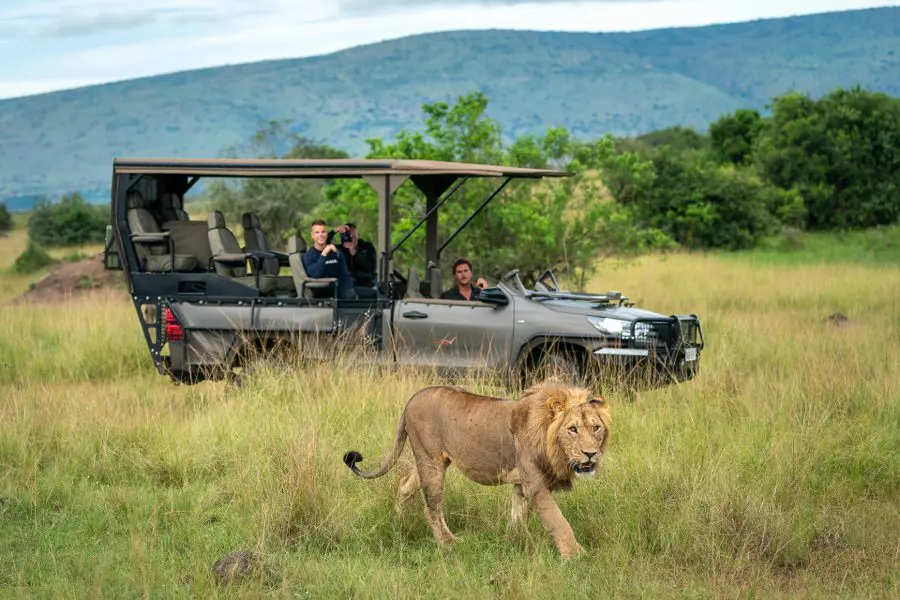Language
- English
- Español
- Français
- Italiano
- Português
- Deutsch
- Nederlands
Currency
- AUD Australian Dollar
- CAD Canadian Dollar
- EUR Euro
- GBP Pound Sterling
- USD US Dollar
- ZAR Rand

costs
Famed for its unique and varied environments – from volcanoes and verdant forests to savannas and rolling hills – Rwanda is an adventurers paradise. One of its primary calling cards are gorilla trekking safaris and the chance to see chimpanzees flit from tree to tree in lush forests. To the south, Akagera National Park draws in travellers with a myriad of safari heavyweights as well as some smaller game. The best times to visit are from June to September and again from late December to February in order to avoid the rainy seasons.
While we could sing Rwanda's praises and all it has to offer for paragraphs to come, the age-old question of what does a Rwanda safari actually cost needs to be answered. Important to note here is that Rwanda is frequently part of a multi-destination trip with the likes of Kenya or Tanzania, so remember to check their associated costs too if you plan to do that. Explore some of our top Rwanda tours and safaris if you’re hoping to enjoy various experiences and locations.
As a fairly compact country, the best places to visit in Rwanda are not too difficult to reach, nor take too long to get to. From the main city and capital, Kigali, Volcanoes National Park and the sought-after mountain gorillas are but a few hours' drive. So, what are your safari options in Rwanda? We break it down below:
A Rwanda safari typically ranges from $900 to $3,600 per person per night based on double occupancy, depending on the level of luxury, season, and type of experience. Mid-range options start around $900, while luxury safaris and 5-star stays near gorilla trekking areas can reach up to $3,600. Costs are influenced by accommodation location, whether gorilla permits are included, and the level of exclusivity.
As with any holiday, what you choose to do, and where you go will impact the general cost of your safari. The below table breaks down costs for Rwanda safaris calculated per person per night sharing in both low and high season:
| Mid-Range | Luxury | 5-Star | |||
|---|---|---|---|---|---|
| Low | High | Low | High | Low | High |
| $9000 pps* | $1,150 pps* | $1,500 pps* | $2,100 pps* | $2,700 pps* | $3,600 pps* |
* Please note: all the costs are guidelines only and an average for per person, per night, sharing a room in High and Low Season. They exclude international flights, visas and optional activities. Note that conservation fees, levies and permits are all subject to change. Peak or High Season generally runs over Christmas and New Year, and from about July to October.

Rwanda accommodation is often divided into two categories, the first being hotels in the capital, Kigali, and safari lodges and camps found in Rwanda's parks and reserves. As Volcanoes National Park is the most popular area for gorilla trekking, staying here is ideal for guests who hope to enjoy forest views, adventurous activities, and the chance to see primates. Accommodation costs will largely depend on the level of comfort and location of a camp or lodge as well as if they offer gorilla treks from the property.
| Entry Level Drive | Mid Range Drive | Luxury Drive | 5 Star Option | ||||
|---|---|---|---|---|---|---|---|
| Low | High | Low | High | Low | High | Low | High |
| $1,030 pps* | $1,100 pps* | $1,850 pps* | $2,100 pps* | $2,200 pps* | $2,800 pps* | $2,400 pps* | $3,200 pps* |
* Please note: all the costs are guidelines only and an average for per person, per night, sharing a room in High and Low Season. They exclude international flights, visas and optional activities. Note that conservation fees, levies and permits are all subject to change. Peak or High Season generally runs over Christmas and New Year, and from about July to October.
The time of year plays a key role in determining the cost of a Rwanda safari, especially for those planning gorilla trekking adventures. Peak travel months, such as June to September and late December to February, fall within the dry seasons—the most desirable times for trekking due to clear trails, comfortable hiking conditions, and lower malaria risk. As a result, prices for accommodation and permits are typically higher during these months. In contrast, the shoulder seasons, when rain is more common, may offer lower rates and fewer tourists, but trekking conditions can be muddy, cooler, and less predictable, with occasional delays or cancellations.
It's important to note that ‘all-inclusive' may not be as comprehensive as you first expect. In Africa, and on safaris, that can mean a range of things and it's always worth clarifying what is not included. One of the first things to do is consult our blog on visa free African countries for US citizens as that may tick off one of the boxes regarding associated costs already. What possible additional costs could you come across? Have a look at our list below:
Should you wish to plan your next great adventure with the help and guidance of one of our Africa Safari Experts, they will be able to advise you on all of the above and ensure each of your transfers is organised ahead of time and occurs as seamlessly as possible – just remember, in travelling, anything can happen and sometimes delays are unavoidable.
Help Me Plan